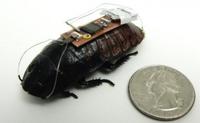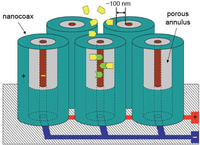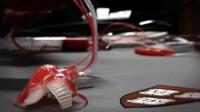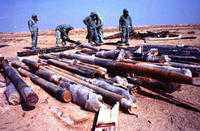-
Maryland rolls out public safety interoperable communication system
To be better prepared for man-made or natural disasters, Maryland leaders have decided to develop Twelve Core Capacities for Homeland Security, picking the deployment of an interoperable communications system as the highest priority; on 5 June 2012, Governor Martin O’Malley inaugurated the state’s new network, known as the Maryland First Responders Interoperable Radio System Team (Maryland FiRST)
-
-
First responders train to deal with a new threat: zombie attack

A company specializing in training military units, federal, and state agencies in security, force protection, emergency response,and disaster management, has a new threat incorporated into its disaster-crisis scenario, which is part of the firm’s annual counterterrorism summit in San Diego: a zombie attack
-
-
New search-and-rescue tool: remotely controlled cockroaches

Researchers have developed a technique that uses an electronic interface to remotely control, or steer, cockroaches; remotely controlling cockroaches would allow first responders to create a mobile web of smart sensors that uses cockroaches to collect and transmit information, such as finding survivors in a building that has been destroyed by an earthquake
-
-
Alcatel-Lucent offers first-responders access to multiple video feeds using 4G LTE
New first responder video solution provides mission-critical information on handheld devices to fire, police, and ambulance services to improve responsiveness, safety, teamwork, and cost efficiency; the First Responder Video solves the network congestion problem by optimizing bandwidth use and integrating multiple video feeds and other operational data into one single stream
-
-
DHS using Boston subway system to test new sensors for biological agents

Bioterrorism is nothing new, and although medicines have made the world a safer place against a myriad of old scourges both natural and manmade, it still remains all too easy today to uncork a dangerous cloud of germs; DHS’s Science and Technology Directorate (DHS S&T) has scheduled a series of tests in the Boston subways to measure the real-world performance of new sensors recently developed to detect biological agents
-
-
Electronic nose detects airborne toxins down to the parts per billion level
Research create an electronic nose device with applications in agriculture, industry, homeland security, and the military; the device can detect small quantities of harmful airborne substances
-
-
How to act if there is a fire on a high-speed train

Researchers have used computer models to analyze the best way to evacuate the Spanish High Speed Train (AVE) in the case of fire; the involvement of the crew in organizing the fast transfer of passengers, completing the process before the train comes to a halt, and collective collaboration to assist those with reduced mobility are just some of the strategies to be followed
-
-
Court: Kentucky can continue to credit God for homeland security
The Kentucky Supreme Court has declined to hear a challenge to a state law that mandated that the commonwealth give credit to God for Kentucky’s homeland security; the Court let stand a 2011 Kentucky Court of Appeals ruling which found that a 2006 law, requiring the Kentucky Office of Homeland Security to publicize dependence on “Almighty God” in agency training and educational materials, did not violate the establishment clause in the Constitutional
-
-
Home, office WiFi could be used by emergency responders
Wireless routers for homes and offices could be knitted together to provide a communications system for emergency responders if the mobile phone network fails
-
-
Soft robots for search-and-rescue and reconnaissance missions

Soft robots are useful because they are resilient and can maneuver through very constrained spaces, which makes them useful for search-and-rescue and reconnaissance missions; researchers show a soft robot made of silicone; it can walk, change color, and light up in the dark; it can even change temperature; it can do all of this for less than $100
-
-
College buys small UAV for first-responder training program
Sinclair Community College in Dayton, Ohio purchases small unmanned aerial system (SUAS) from UTC Aerospace Systems for use in the college’s training program for first responders
-
-
Immediate, in-the-field identification of hazardous materials

Soldiers in war zones, and law enforcement and first responders on the scene will soon have the ability to collect and immediately analyze trace amounts of potentially dangerous chemical, explosive, or biological agents with the help of a surface swabbing device developed and prototyped by a Maine-based technology company with the help of the University of Maine researchers
-
-
Improved disaster resilience is imperative for U.S: report
A new report from the National Academies says that it is essential for the United States to bolster resilience to natural and human-caused disasters, and that this will require complementary federal policies and locally driven actions that center on a national vision – a culture of resilience; improving resilience should be seen as a long-term process, but it can be coordinated around measurable short-term goals that will allow communities better to prepare and plan for, withstand, recover from, and adapt to adverse events
-
-
DHS develops active shooter national guidance
DHS has selected a training program from the Center for Personal Protection and Safety (CPPS) as resource in developing national guidance for how to respond to an active shooter situation
-
-
Forget blizzards and hurricanes, heat waves are deadliest

Tornadoes, blizzards, and hurricanes get most of our attention because their destructive power makes for imagery the media cannot ignore; for sheer killing power, however, heat waves do in far more people than even the most devastating hurricane; Hurricane Katrina and its floods, which devastated New Orleans and the Gulf Coast in 2005, exacted a death toll of 1,836 people; the heat wave which enveloped Europe during the course of three excruciating weeks in August 2003 of that year, killed an estimated 70,000 people
-
- All
- Regional
- Water
- Biometrics
- Borders/Immig
- Business
- Cybersecurity
- Detection
- Disasters
- Government
- Infrastructure
- International
- Public health
- Public Safety
- Communication interoperabillity
- Emergency services
- Emergency medical services
- Fire
- First response
- IEDs
- Law Enforcement
- Law Enforcement Technology
- Military technology
- Nonlethal weapons
- Nuclear weapons
- Personal protection equipment
- Police
- Notification /alert systems
- Situational awareness
- Weapons systems
- Sci-Tech
- Sector Reports
- Surveillance
- Transportation
Advertising & Marketing: advertise@newswirepubs.com
Editorial: editor@newswirepubs.com
General: info@newswirepubs.com
2010-2011 © News Wire Publications, LLC News Wire Publications, LLC
220 Old Country Road | Suite 200 | Mineola | New York | 11501
Permissions and Policies
Editorial: editor@newswirepubs.com
General: info@newswirepubs.com
2010-2011 © News Wire Publications, LLC News Wire Publications, LLC
220 Old Country Road | Suite 200 | Mineola | New York | 11501
Permissions and Policies
